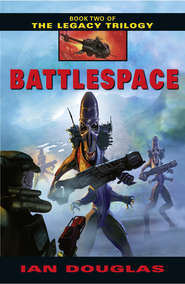По всем вопросам обращайтесь на: info@litportal.ru
(©) 2003-2024.
✖
Dark Matter
Настройки чтения
Размер шрифта
Высота строк
Поля
“I see. And how are you going to get around the White Covenant?”
“The White Covenant prohibits attempts to proselytize,” Konstantin replied, “and it directly prohibits the use or the threat of force to effect conversions as a basic violation of human rights. It does not prohibit the establishment of a new faith.”
Centuries before, late in the twenty-first century, a particularly nasty war between the West and radical Islam had ended . . . in part because Western psyops programs had created the White Covenant, a gentlemen’s agreement among the winners that proselytizing in any form was a violation of basic human rights to believe and to worship according to one’s own conscience. Ultimately, full membership in the newborn Earth Confederation for any nation had depended upon acceptance of the Covenant.
And at the same time, an early application of recombinant memetics, then in its infancy, had made proselytizing, the fear of hell or judgment, and even the very idea of fundamentalist acceptance of sacred writings as God’s literal word . . . embarrassing. Passé. Even insulting. Populations that rejected the Covenant were encouraged to practice their beliefs . . . elsewhere, in deep space colonies out beyond Pluto, or even on the worlds of distant suns. Mufrid, at Eta Boötis, had been one such colony, until its destruction twenty years ago by the Turusch.
What the hell did Konstantin have in mind?
“Good luck with that,” Koenig said. “People tend to take their religions seriously.”
“Some do, though for many it is more a matter of convenience. Very often, religion is an accident of where a person was born, or when.”
“True. But there’s going to be a lot of back-blast and noise when you launch it.”
“Secrecy will be essential,” Konstantin observed.
Konstantin had pulled off some miracles lately in its dealing with the Confederation, but Koenig thought that this time the system might have bitten off more than it could process. Propaganda always ran into the basic problem of knee-jerk rejection by the target society—called back-blast in RM terminology—and, more, there often were so many competing voices out there in the memetic ether that it was impossible for any one message to be heard over the noise. Basic commercial advertising starting back in the twentieth century had been a primitive form of RM, using jingles and product placement and sexy spokespersons to sell, say, a certain brand of ground car. But when a dozen other companies were countering with jingles and ads dripping with sex of their own, the result was . . . noise, and lots of it, enough to render such ads largely ineffective.
There were also defenses, AI agents that patrolled cyberspace in search of potentially dangerous memes, like antibodies.
The best way to get a memetic virus through the noise and the defenses was to do so without the target being aware.
“It is imperative that we end the civil war within the Confederation as swiftly as possible,” Konstantin went on. “A recombinant memetic attack on the Geneva leadership gives us a good chance of uniting Humankind before the Sh’daar or the unknown alien threat at Omega Centauri can act.”
“But we still don’t have a clue as to how to defeat the Sh’daar,” Koenig said. “And we know even less about the Rosette Aliens.” He hesitated, thoughtful. “It’s the time-travel aspect that bothers me, Konstantin,” he said at last. “With that one factor alone, they ought to be able to walk all over us.”
The Sh’daar Collective was a truly formidable enemy. No human knew just how big the Collective actually was. At the very least, it included within its far-flung embrace well over a thousand distinct star-faring species scattered across perhaps a quarter of the galaxy, and controlled the resources of thousands more that for one reason or another had never ventured into space.
The discovery that at least one TRGA cylinder gave direct access from the Milky Way at time now to the N’gai Cloud some 876 million years in the past added the dimension of time to the problem. What passed for a Sh’daar galactic government appeared to be based in what Confederation intelligence called Omega Centauri T-0.876gy, the designation for the N’gai Cloud as it was almost 0.9 of a gigayear before time now, but it evidently had spread through time as well as space. How such a possibility could be made to work without endless complications from temporal paradox remained one of the great unsolved mysteries of galactic history.
And with that kind of strategic advantage, one would think that the Sh’daar could have intervened at any point in Humankind’s history or even prehistory and written humanity out of existence. Suppose a Sh’daar battlefleet had showed up over the Earth of 876 million years ago, when terrestrial life—still limited to bacteria and protists and blue-green alga—was confined to the sea. They could have glassed over the Earth, boiled away the ocean, bombarded what was left with high-energy neutrons . . .
Exterminated the life in those ancient terrestrial seas and Humankind would never have appeared.
The fact that the Sh’daar had not eradicated all life on Earth by rewriting history suggested that there was more to the problem than was immediately obvious.
The problem, Koenig thought, likely had to do with a key aspect of what it meant for species to be mutually alien. The Turusch, the H’rulka, the Nungiirtok, the Slan . . . all were client species of the Collective and all, at one time or another, technic species that had attacked human forces in Tprime, meaning time now, captured human interstellar colonies, and even launched assaults on Earth herself. And while there’d been attempts at joint operations—the Nungiirtok were specialists in ground warfare, for example, and had invaded the colony on Osiris in conjunction with Turusch fleet elements—the different Sh’daar clients were so different from one another—in physiology, yes, but especially in psychology—that they apparently had trouble coordinating military operations with one another. The Sh’daar guided their clients, or tried to, through the Seeds . . . but either the distances were too vast or the number of Seeds sending back data was too large. Whichever it was—and it might well be both—the Sh’daar Empire was not particularly efficient in the ways it dealt with ambitious upstarts like Humankind.
Humankind, Koenig believed, possessed one vital advantage in its struggle with the Sh’daar, something he privately thought of as the Greek advantage. Koenig was a thoroughgoing student of history, and was among other things fascinated by the spectacular victories of the ancient Greeks over the far larger and more diverse Persian armies at Marathon, at Plataea, and, later, by Alexander the Great over Darius. Like the Greek city states of 2900 years earlier, modern Earth was far from united . . . but the member species of the Sh’daar Collective had so little in common with one another that communications—even facilitated by Agletsch pidgins—must be very nearly impossible.
So far, Humankind had managed to use that essential disunity, beating Sh’daar client species in turn rather than en masse. The question, though, was whether the enemy would learn from those defeats and get their collective act together. If they did, when they did, humanity would be in very serious trouble indeed.
Somehow, Earth needed to unite, and then end the Sh’daar threat once and for all. If Konstantin could pull that off with memegeneering, well and good. If he could not, then Humankind’s long-term survival was very much in doubt.
And so far as Koenig could tell, Humankind was running out of useful options.
Chapter Five
12 February 2425
Washington, D.C.
USNA Periphery
1220 hours, EST
“Damn it, Lieutenant, we need trained pilots! Lots of them! You were one of our best! It’s your duty to volunteer!”
Shay Ashton looked the small, gray man up and down, almost openly sneering. “If service is mandatory, how the hell can I volunteer?” she said. “You can go to hell!”
“Lieutenant Ryan—”
“It’s Ashton, not Ryan,” she snapped. She’d married after she’d returned to the D.C. Ruins, though Fred had been killed ten years later by marauders from across the broad and tide-swollen Potomac. This USNA government agent wouldn’t understand. To him, taking the name of the person you married was quaint, a holdover from a long-gone era . . . or, worse, that she was a filthy “monogie”—a pervert who dared to believe in monogamous marriage.
She saw emotion flicker across the man’s face—disdain, possibly disgust. But in the lawless territories of the Periphery, cast off centuries ago by the rest of the country, monogamy had carried a certain survival value . . . two people so closely bonded that each could watch the back of the other in a way not possible for complicated line marriages, polyamories, or ménages a politique.
Behind her, a city, at once ancient and newly born, was growing skyward from mangrove swamp and muck. The relentless global rising of the oceans four centuries ago had finally flooded the low-lying regions along the U.S. coast, forcing their evacuation. But not everyone had been willing to leave their home. . . .
For centuries since then, the stay-behinds, the “swampies,” had inhabited the former capital of the old United States, fish-farming among the tangled mangrove swamps now growing along what once had been the Washington Mall. When the US had reorganized itself as the United States of North America and as a founding member of the Earth Confederation, the Periphery—including low-lying and flooded coastal areas like Manhattan, Boston, and Washington, D.C.—had been abandoned by a government unable to afford the massive costs and effort of beating back the encroaching sea. The people still living in those areas had adapted, as people do, living in the ruins without modern technology or medical care, making their own law, and becoming fiercely independent in the process.
The Periphery had become a major political issue, however, when Geneva had attempted to seize those regions, to take them over as a trust. The inhabitants had fought back an assault three months ago; the massive, broken shell of a Confederation Jotun troop flier still lay on its side in the shallow waters of the Washington Mall, partially obscured by the enthusiastic tangle of mangroves around it. Ashton had somehow found herself in command of the ragged band that had defended the Ruins, holding out until USNA aerospace forces had arrived to turn the tide decisively in the defenders’ favor.
Since then, USNA troops and equipment had been pouring into the areas around both D.C. and Baltimore, and reportedly up in the Manhattan Ruins too. Ashton was grateful for the help . . . but gratitude did have its limits. She hadn’t asked for the government’s help.
“Whether you like it or not,” the government man said, “the USNA has taken over direct control of the Peripheries. You are citizens of the USNA now, and as such you have both rights and responsibilities. That is especially true of former military personnel such as yourself.”
She held a middle finger up under his nose. “See this, Government Man?” she snapped. “Sit and rotate!”
“Lieutenant Ashton—”
“I retired, damn it! I put in my time, and I retired, okay? You do not own me!”
The man nodded toward the downed Jotun. “Looks like you’ve been doing a pretty good job of it since your retirement.”
In fact, that troop flier had been brought down by a flight of USNA Starhawk fighters. But she wasn’t going to mention that.
“This is my home, okay? I have a right to defend it.”
“Granted. And we’re offering you a chance to make sure the Confederation doesn’t try to grab your home from you again.”
“You can fight your own damned war. I’m not playing.”
The man sighed. “Well, I’m not going to force you. USNA jurisdiction is still . . . a bit fuzzy out here in the Periphery, and will be until we formally re-annex it. I will ask you why you won’t help us, though. You were an outstanding Starhawk pilot. Excellent record . . .”
“Like I said . . . I put in my time. And they need me here. This is . . . home.”
“Okay. Let’s leave it at this.” He focused a thought, sending Ashton a mind-to-mind eddress, which her in-head circuitry dutifully recorded and logged. “We want you to volunteer for an electronic incursion into Geneva. It’s a no-risk op; you’ll go in clean and virtual. Your fighter skills are very much needed in this operation, and if you succeed, you will ensure Washington’s freedom from the Confederation. If you can see clear to changing your mind, give me a yell. Fair enough?”











